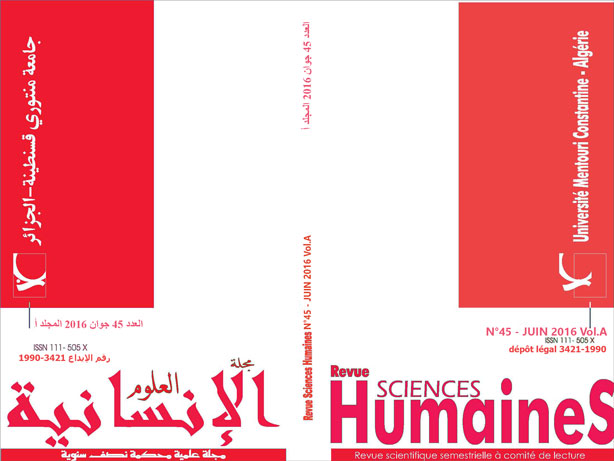The Development of Intercultural Communicative Competence in Foreign Language Teaching
Keywords:
Development, Intercultural Communicative Competence, Foreign Language TeachingAbstract
We make part of a contemporary globalized world characterized by extensive communication between people of different cultural backgrounds and languages. In a modern foreign language teaching and learning context, this entails that learners should be aided in developing their intercultural communicative competence. Put differently, in order to function appropriately and smoothly in intercultural situations, learners should be made aware of a set of fundamental facts about the culture that vehicles a foreign language, master a range of communicative skills and adopt new attitudes of tolerance and acceptance of culture-specific norms and behaviours. The present paper attempts to shed light on the situation of teaching culture at the Department of English, University of Jijel, and the need to develop third-year-LMD-students’ intercultural communicative competence
Downloads
References
References
Aguilar, M.J.C. 2007. Dealing with intercultural communicative competence in the foreign language classroom, in Soler, E.A. and Jorda, M.P.S. (eds.), Intercultural Language Use and Language Learning. (pp 59-78). Springer.
Brown, H.D.1994. Teaching by Principles: An Interactive Approach to Language
Pedagogy. Englewood Cliffs (New Jersey): Prentice Hall.
. 2000. Principles of Language Learning and Teaching. Prentice Hall Regents, New Jersey, USA
Byram, M. 1989. Cultural Studies in Foreign Language Education. Multilingual Matters, Clevedon.
. 1997. Teaching and Assessing Intercultural Communicative Competence. Clevedon: Multilingual Matters Ltd.
Byram, M. and Fleming, M. (eds.), 1998. Language Learning in Intercultural Perspective: Approaches through Drama and Ethnography. Cambridge: Cambridge University Press.
Byram, M. and Morgan, C. 1994. Teaching-and-learning Language-and-culture. Clevedon: Multilingual Matters.
Canale, M. 1983. From communicative competence to communicative language pedagogy, in Richards J.C., Schmidt, R.W. (eds.), Language and Communication. (pp 2–27). London: Longman.
Canale, M. and Swain, M. 1980. Theoretical bases of communicative approaches to second language teaching and testing. Applied Linguistics,Vol. 1: 1-47.
Chastain, K. 1988. Developing Second Language Skills. Theory and Practice. Orlando, Florida: Harcourt Brace Janovich Publishers.
Chomsky, N. 1965. Aspects of the Theory of Syntax. Cambridge: MIT Press.
Duranti, A. 1997. Linguistic Anthropology. Cambridge: University Press.
. 2001. Linguistic Anthropology: A Reader. Blackwell Publishing.
Hofstede, G. 1994. Cultures and Organizations: Software of the Mind. London: Harper Collins Business.
House, J. and Kasper, G. 2000. How to remain a non-native speaker, in Riemer, C. (ed.),
Kognitive Aspekte des Lehrens und Lernens von Fremdsprachen. Narr: Tübingen, (pp 101–118).
Hymes, D.1972. On communicative competence, in Pride, J.B., Holmes, J. (eds.), Sociolinguistics: Selected Readings. Penguin: Harmondsworth, (pp 269–293).
Kramsch, C. 1993. Context and Culture in Language Teaching, Oxford: Oxford University Press.
. 1998. The privilege of the intercultural speaker, in Byram, M. and Fleming, M. (eds.), Language Learning in Intercultural Perspective: Approaches through Drama and Ethnography. Cambridge: Cambridge University Press.16-31
Meyer, M. 1991. Developing transcultural competence: Case studies of advanced foreign language learners, in Buttjes, D., & Byram, M. (eds.), Mediating Languages and Cultures: Towards an Intercultural Theory of Foreign Language Education. (pp.136-158). Clevedon, UK: Multilingual Matters.
Moran, P. R. 2001. Teaching culture: Perspectives in Practice. Boston: Heinle & Heinle
Peck, D. 1998. Teaching Culture: Beyond Language. Yale: New Haven Teachers Institute.
Politzer, R. 1959. Developing Cultural Understanding Through Foreign Language Study. Report of the Fifth Annual Round Table Meeting on Linguistics and Language Teaching, pp. 99-105. Washington, D.C.: Georgetown University Press.
Risager, K. 2007. Language and Culture Pedagogy: From a National to a
Transnational Paradigm. Clevedon: Multilingual Matters.
Samovar, L., Porter, R. & Jain, N. 1981. Understanding Intercultural Communication. Belmont, CA: Wadsworth.
Seelye, H.N. 1993. Teaching Culture: Strategies for Intercultural Communication. Lincolnwood IL: National Textbook Company.
Stern, H.H. 1992. Issues and Options in Language Teaching. Oxford: OUP.
Thompson, J. 1990. Ideology and Modern Culture. Stanford: Stanford University Press.
Tomalin, B.S. and Stempleski, S. 1993. Cultural Awareness. Oxford: OUP.
Tylor, E. B. 1871. Primitive Culture: Researchers into the Development of
Mythology, Philosophy, Religion, Language, art and Custom. London: John
Murray.
















